We're Going Google...
In the search ecosystem Google controls the relevancy algorithms (& the biases baked into those) as well as the display of advertisements and the presentation of content. They also control (or restrict) the flow of marketable data.
For example, a publisher might not get keyword referral data on organic search, but Google passes that data on via advertisements & passes a large amount of data on through their ad network to other ad networks. Consider this:
a DoubleClick tag on the site sent data to two other companies that collect it for various purposes -- Rubicon and Casale Media, representing a "hop." In a subsequent hop, Casale transferred the IMDB data to BlueKai, Optimax and Brandscreen, while Rubicon pushed it to TargusInfo, RocketFuel, Platform 161, Efficient Frontier and the AMP Platform. AMP then sent the data on to AppNexus and back to DoubleClick.
For about a decade being relevant & focused created efficiencies that more than offset any "size = quality" biases that the Google engineers created. However across many verticals that window is closing & it is never a good idea to wait until it is fully closed to adjust. ;)
This shift from relevancy to "size = quality" can be seen in the stock performance of mid-market companies like BankRate & Quinstreet.
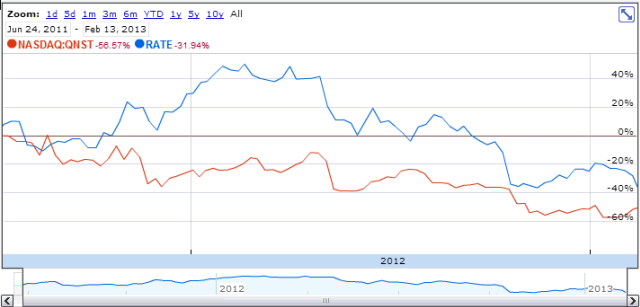
Those companies were laser focused on the markets that have significant consumer intent & traffic value, but Google has eroded the affiliate base & ad networks of many of the direct marketing plays for a couple years straight now.
If Google's algorithmic biases are strong enough to literally move the market on companies worth hundreds of millions to billions of Dollars, one is naive to swim against the tide. The market is becoming more bifurcated.
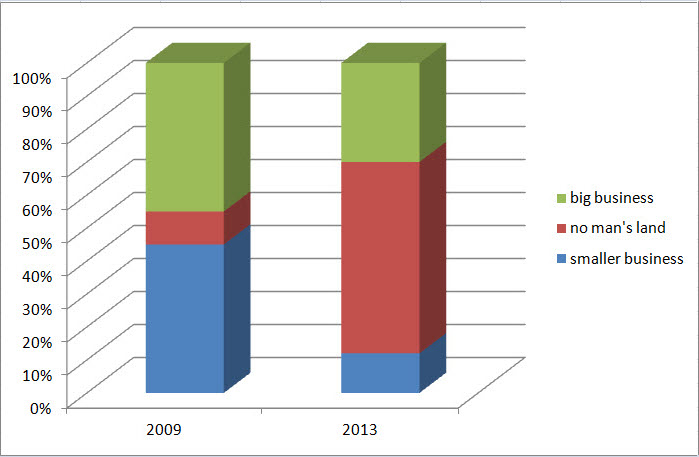
This is why it is so hard to find a great SEO to recommend for small businesses. If that SEO really knows what they are doing & understands the market dynamics, then they probably won't serve the small business end of the market very long, or if they do, they will do so in a way where their continued flow of payments is not tied to performance. It is hard to have a sustainable business operating in a closed ecosystem if you are swimming in the opposite direction of that ecosystem.
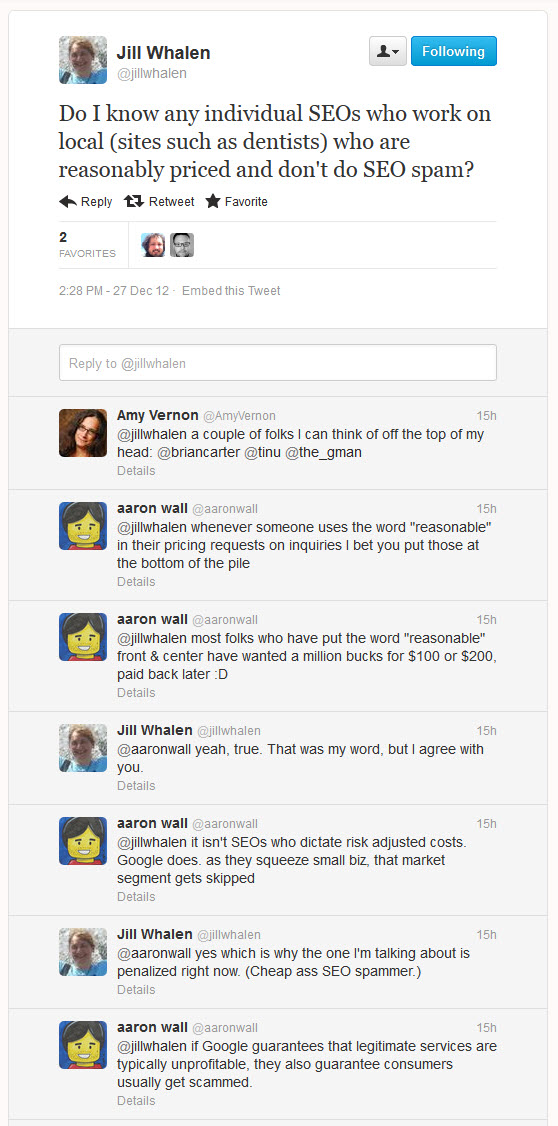
In terms of our membership site here, a good slice of our customer base is the expert end of the market.
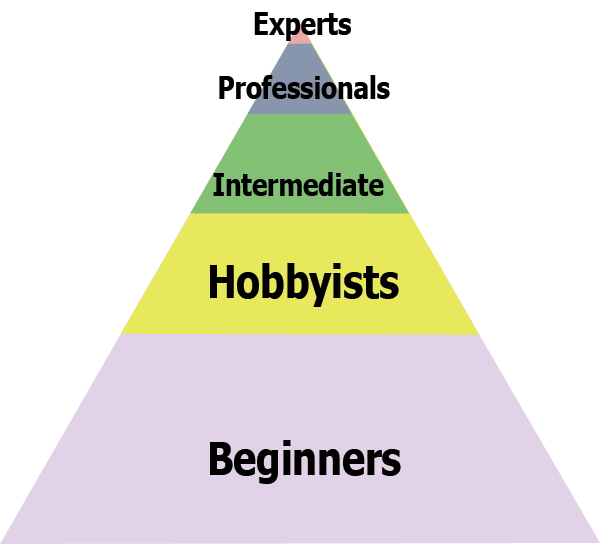
It is a tiny sliver of the market, but it is a segment that is somewhat well aligned with independent affiliate types & the sort of direct marketing relevancy-minded folks that Google has spent a couple years trying to marginalize as they cater to branded advertisers. We could try to shift our site to make it more mass market, but I prefer to run a site where we both learn & teach, and fear that moving to lower the barrier to entry and push more mass market will destroy what makes the membership site unique & valuable in the first place.
In early Google research they warned about relevancy shifting toward the interest of advertisers.
Currently, the predominant business model for commercial search engines is advertising. The goals of the advertising business model do not always correspond to providing quality search to users. For example, in our prototype search engine one of the top results for cellular phone is "The Effect of Cellular Phone Use Upon Driver Attention", a study which explains in great detail the distractions and risk associated with conversing on a cell phone while driving. This search result came up first because of its high importance as judged by the PageRank algorithm, an approximation of citation importance on the web [Page, 98]. It is clear that a search engine which was taking money for showing cellular phone ads would have difficulty justifying the page that our system returned to its paying advertisers. For this type of reason and historical experience with other media [Bagdikian 83], we expect that advertising funded search engines will be inherently biased towards the advertisers and away from the needs of the consumers.
Perform that same cellular phone search today & that original cited page is nowhere to be found. Today that same search includes Wal-Mart, T-mobile, Samsung, Amazon.com, Best Buy & other well known brands. Search for the more common phrase cell phones & you get the same brands plus local results and shopping results. Awareness is replacing precision.
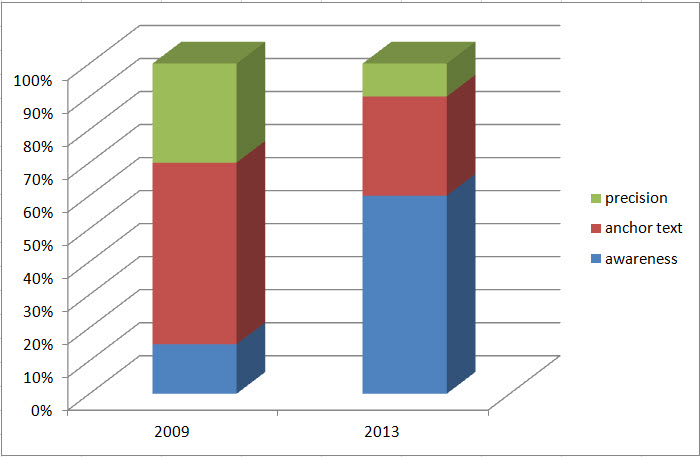
I think Gabe Newell described it best:
Closed platforms increase the chunk size of competition & increase the cost of market entry, so people who have good ideas, it is a lot more expensive for their productivity to be monetized. They also don't like standardization ... it looks like rent seeking behaviors on top of friction
As Google makes search more complex & mixes in more signals, it is becoming harder to win at the game if your operation is singularly focused on SEO & it is becoming easier to win if your business already has a strong footprint in many other channels which bleeds into your search profile. The following chart is conceptual, but it aims to get the issue across.
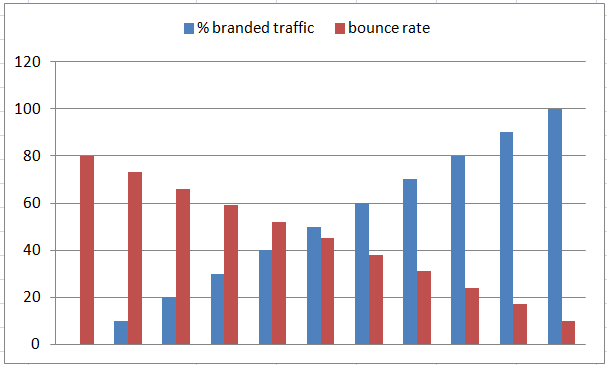
If one company is spending significant capital & effort trying to combat the Panda algorithm & another company automatically sees a ranking boost from Panda, then the company with the boost is typically going to see greater ROI from any further investments in SEO.
Having spilled all the above digital ink, back in 2007 we decided to shift away from an ebook model to run a membership site. On and off over the years we have done a bit of consulting outside of running this site, but haven't put significant emphasis on it over the past couple years as we were pushing hard to keep up with the algorithms & keep this site growing. With all the above shifts in place we recently decided to offer SEO consulting again.
Some FAQs on that front...
- If we work with you, who will be working on our project? The same people who write on the blog & run the community: Peter Da Vanzo, Eric Covino & Aaron Wall.
- How many clients will you work with? Just a handful at any given time. We prefer to have a deep integration with a few clients rather than a bulk model.
- Who are ideal clients? Those who know the value of search traffic & already have some general awareness & momentum in the marketplace. Examples of companies we have worked with in the past include: large ecommerce companies, tier 1 web portals, strong start ups & hedge funds invested in the web. Many of these clients already had an in-house SEO team & some were just actively beginning to leverage search.
- I have a tiny company with a small budget. Could I still work with you? In some cases there might be a fit, but if you feel our consulting is beyond your budget you can of course still join our membership website. Consulting is for those who want a deeper engagement than we can provide through our current membership site model.
- Can you name some past clients? For the most part, no. Our consulting projects typically come with nondisclosure agreements.
- Can you fill out an RFP? Most likely not. If you are still shopping around for an SEO, we are probably not going to be a great fit. But if you have known of us for years & know you want to work with us, do get in touch.




Comments
As these charts show, it's an extremely difficult time for small business. To get Organic traffic to a new small business website with a annual budget less than $5,000 is almost impossible. As the previous article stated, the data driven model that Google is using is hurting small business. Even with Adwords, it's difficult to get good ROI without good quality score.
What I don't see in those charts is user experience. It appears to me , that user experience is a major ranking factor in organic SEO and quality score. Yet quality user experience is expensive. Beyond the reach of most small businesses. As this chart shows, the vast majority of businesses in America are small business with less than 10 employees, http://www.census.gov/econ/smallbus.html.
Now assuming that we follow the advice here, and look beyond small business for our clients, that eliminates a very large group of people. I think that advice is very accurate, however, I think it's also very sad.
....where it has that "branded search vs bounce rate" ... that conceptually includes investments into user experience. Those who have millions of Dollars to pour into brand building should also spend significantly on improving user experience. (Which is certainly generally true outside of some edge case market monopolies). Awareness & affinity are also to some degree like usability, in that if people really like you & what you do then they will be willing to deal with a bit more friction & be more forgiving of any issues they come across.
As an example of the great lengths some sites go to...one person who had a complaint about something while I was traveling was complaining for the sake of complaining & allegedly he was pissed off that customer service took 4 hours on a weekend while I was traveling. 3 of those 4 hours were me hacking with PHP coding in order to configure the site *precisely* to that individual's liking (in spite of literally nobody else complaining about that issue). They still wanted an immediate refund because allegedly it was inappropriate that it took me 4 hours to configure the site to their tastes and was inappropriate that I was unable to do it realtime over the phone...on a weekend no less! I am not saying our site is perfect (it is slightly less than ideal for people who haven't paid & we don't offer free account users customer service ever since one of our employees had a health issue from dealing with entitled rage-driven freetards), but rather that we try pretty hard to have issues fixed quickly when they come up & have rather limited resources with only a handful of employees. If we were spending millions on marketing then we would also be pouring millions into improving user experience too.
So much of what we do is based upon what our paying customers tell us. We don't do ad retargeting. And that likely means NOT making lots of sales. But we skip those sales because about a half-dozen members in our community told us they can't stand sites that do that. We rely on their word of mouth to drive further growth in membership to make up for any churn, but we do sacrifice sales to make them happy. Also if someone joins the forums & is rude to other members we will boot them fast. We have done this about 3 or 4 times in as many years. And we aggressively police hawking/sales within the community. Some people who try to push stuff too aggressively while not participating in the site other than trying to sell stuff get a stiff warning and/or boot. As an example of how few hard sales messages we have in the forums, when this post went live on the blog it was automatically syndicated to the forums & I deleted it within a minute, because I didn't want members to feel like they were being upsold.
Perhaps were talking about here is the same thing using different terms. I'm talking about conversion rate optimization. This is reflected in click through's, or generally speaking user experience, or what Google calls engagement.
A typical small business website will contain large images or sliders done by a website designer to impress the owner of the website. These things violate basic rules for conversion rate optimization. Most small business websites have poor conversion rate optimization. They cannot afford professionals to guide them in this area.
Is my belief, that this “engagement” from a poorly CRO'ed website or a well designed CRO website is a major ranking factor in organic search and a major factor in quality score.
Because CRO is expensive, small business is locked out again. In fact many don't even realize they need CRO. Many small business owners do not have the knowledge of what is needed on a website for it to succeed. This goes back to Google's data-driven model.
But my question here is, where is the OUTRAGE?
The theme of this article is that it's not profitable to do business with small business. Now let's stop and think about that. Most of the people here are small business. I define that is having under 10 employees. I can't imagine and SEO firm with more than 10 employees. If those employees are onshore employees, the overhead is staggering! I shudder to think how many clients they need to have just to break even.
Now let's think about what were saying. As small business people, we cannot profitably ( a.k.a. Stay out of bankruptcy) do business with small business people. How does this make sense? If we look back over history, have we ever seen anything like this? What is the future? How long can this model go on?
Conversion rate optimization is one type of optimization, but another form of optimization that is every bit as important is retention. It is cheaper & easier to keep current customers than it is to go out and find more customers.
If you have a base of people consistently invested in what you are doing (be it employees, customers, even RSS subscribers that invest their attention) then their participation mixes in with the overall profile to lift the overall engagement metrics for the site. Those repeat visitors are going to have much higher aggregate engagement metrics than any mix of new visitors would.
Have you not read our site for the past half-decade? Has anyone spilled as much digital ink as I have on this topic?
I know personally of at least a few with 100 or more.
Some of business models are set up where you need 2 or 3 customers per employee. And if clients are on a 5 figure per month retainer & you don't live in New York City or San Francisco then a 1:1 ratio is possible ... though perhaps 10:1 to 20:1 or such is far more common.
We don't create the search ecosystem. If the search ecosystem is the majority of our business then we must "play along" with the makers of that ecosystem or we go under. Google is a market monopoly & their powers are extensive. Tim Wu's book The Master Switch is a great historical read on how this same transition happened to: telephones, AM, FM, film & TV.
Yes Aaron you have been a voice in the wilderness on this Small Business issue.
Thank you for all the QUALITY free information you provide here.
Adsense ads? or some other ad network? SearchEngineLand seem to do be happy to run ads out front. Why not you guys?
I mean it is not like we haven't seen this sort of thing before. Everyone has got to make a buck to eat. So I doubt us guys that hang out here in your free area would care if you had ads.
Obviously I don't know all the ins and outs of your operation so there might be another reason not to run ads. It is just a suggestion.
...perform horribly on sites about SEO, as most people reading these sorts of sites know the ads are ares & thus never click on them. ;)
Further, I would feel guilty about promoting $100 "search engine submission" packages & the other flotsam / scams in the AdSense ads on SEO-related topics. And that we would be willing to promote that stuff would cheapen our brand and cost us far more than it made.
If you have a direct ad team and can get a strong CPM then sure selling ads to some of the venture funded paid search management platforms can make sense, but we are far too small to do direct ad sales, thus we are better off with the only ads being for our membership site and the occasional affiliate promotion here or there.
Add new comment